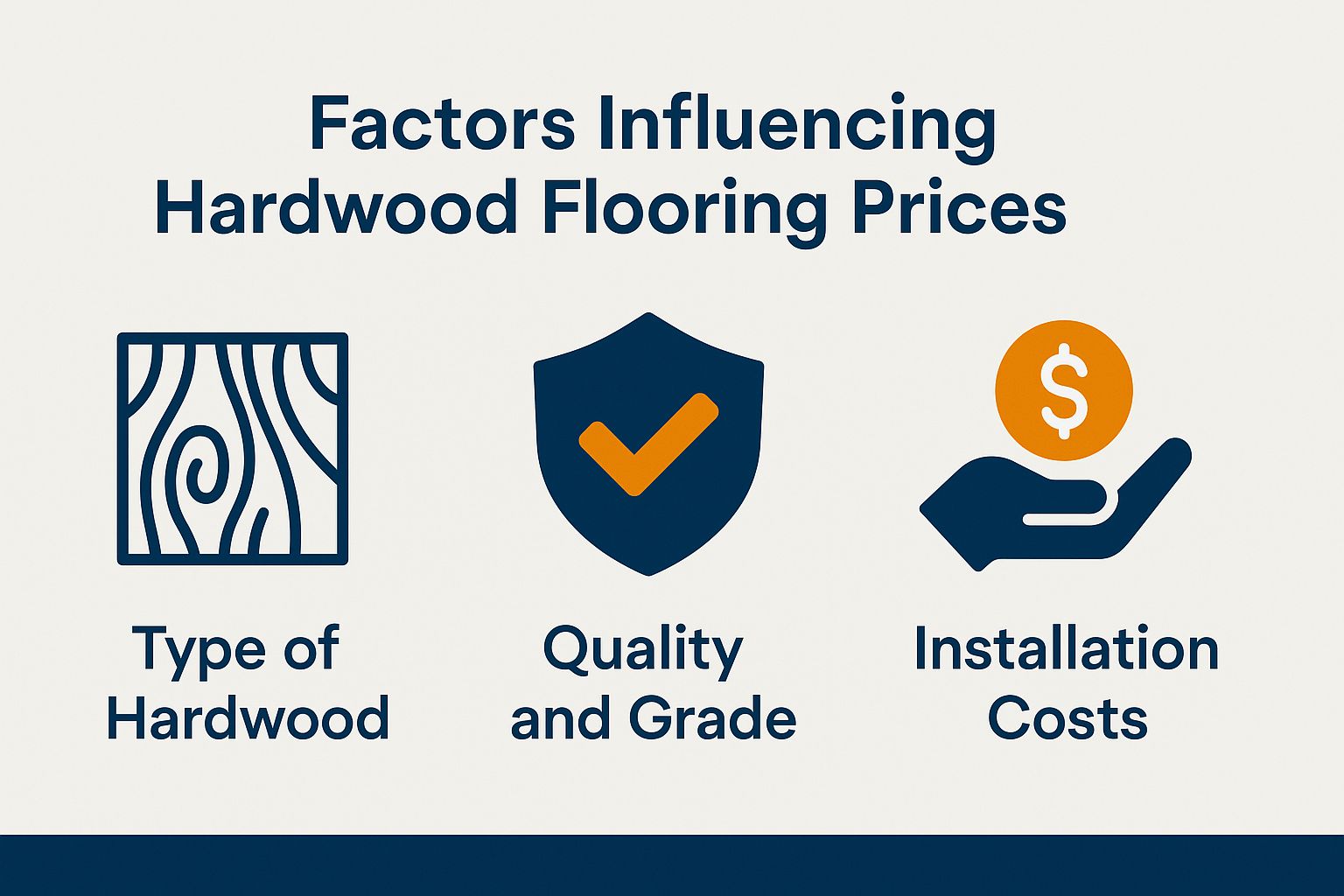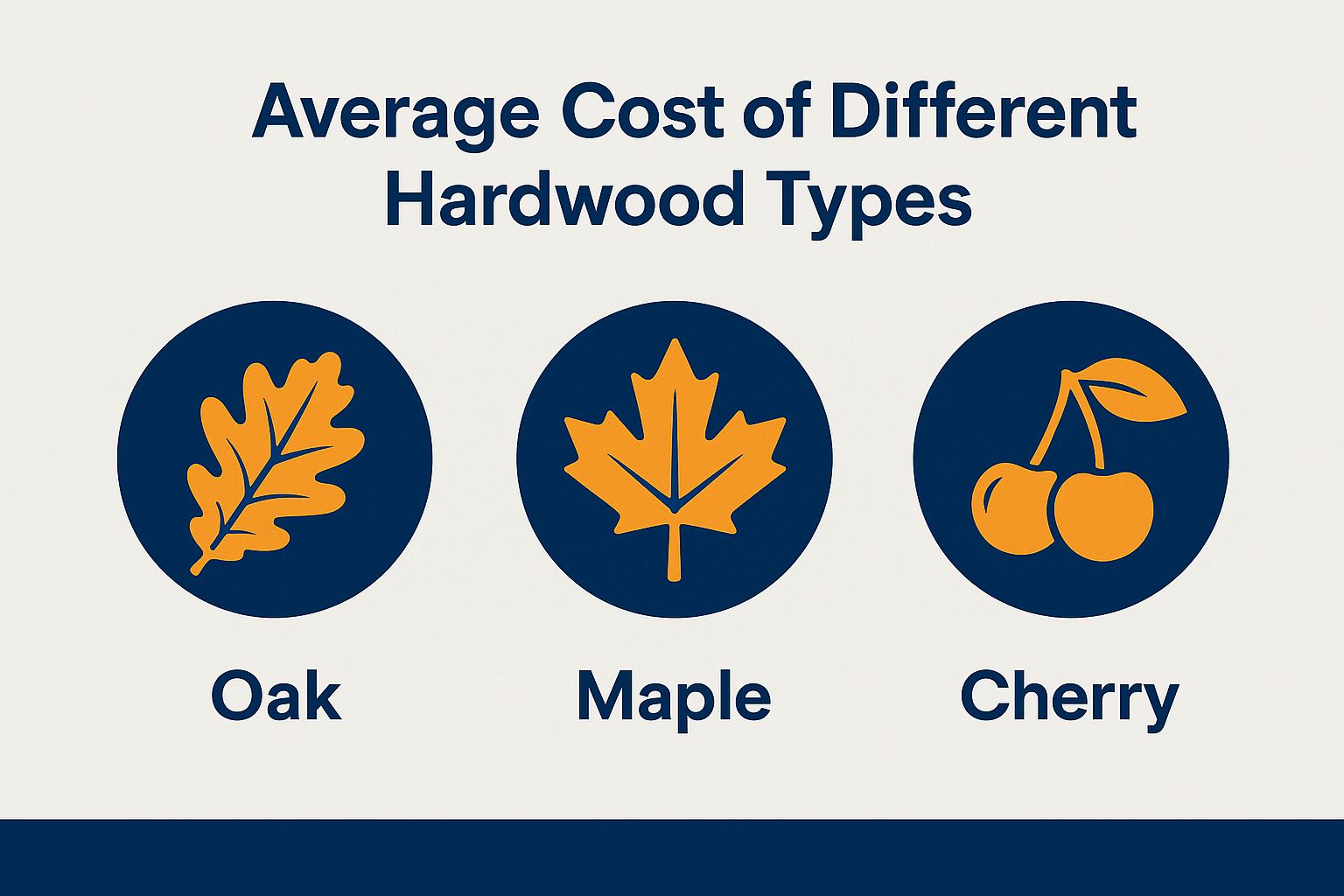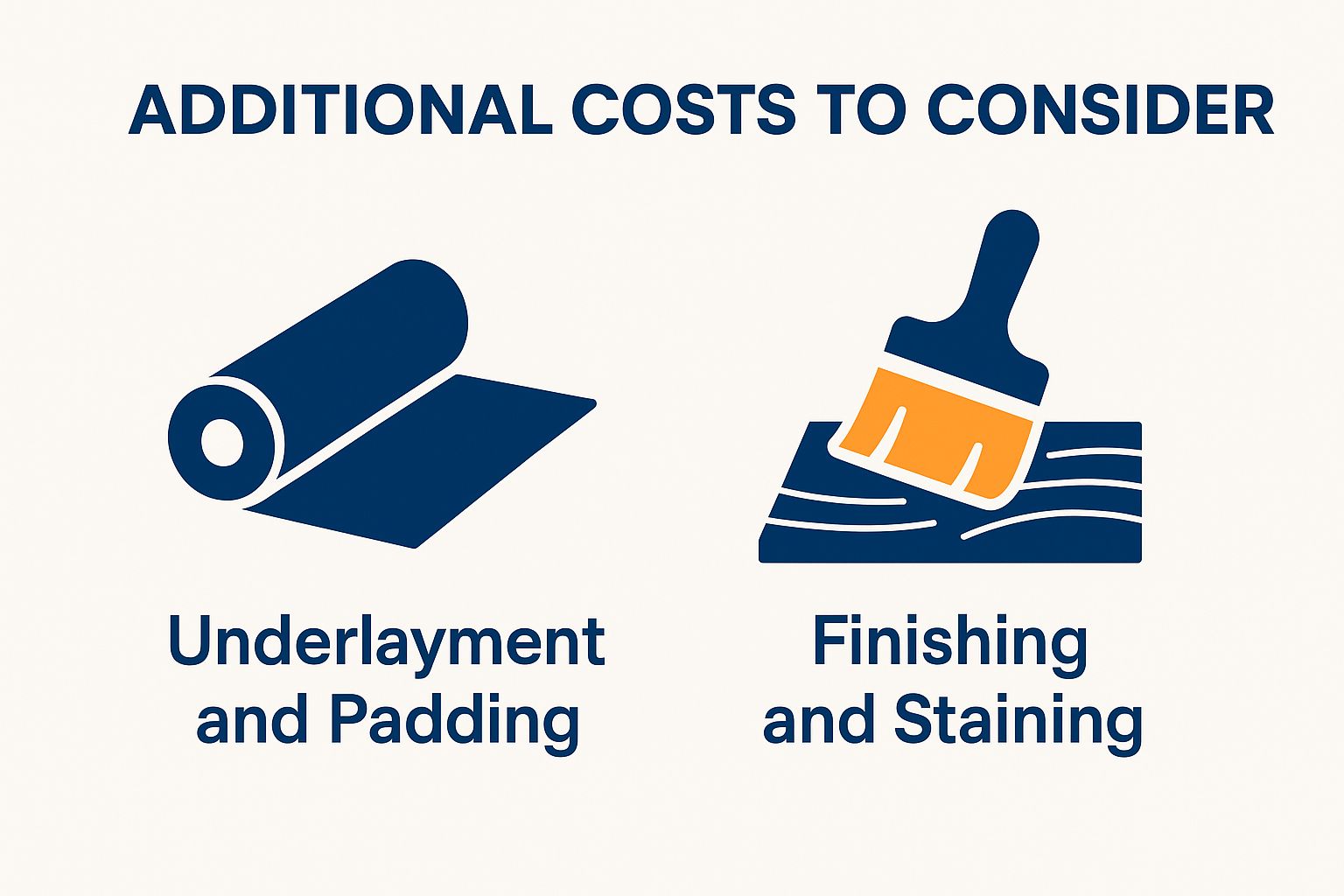
Understanding Hardwood Flooring Costs
Understanding the average cost range for hardwood floors is essential for making informed decisions. Francisco Romero of Romero Hardwood Floors Inc. states that the total expense includes material costs, labor costs, and subfloor preparation. Whether you’re eyeing luxurious oak or budget-friendly yellow pine, this article will guide you through the factors influencing pricing, helping you budget effectively for your hardwood flooring project.
Factors Influencing Hardwood Flooring Prices
Several factors impact hardwood flooring costs, including the type of wood, quality, and installation complexity.

Type of Hardwood
Solid hardwood, like Red Oak, is durable and can be refinished multiple times. This makes it ideal for high-traffic areas. Conversely, engineered hardwood is constructed from layers to enhance stability, making it particularly suitable for moisture-prone environments; Maple is a frequently chosen species in this category due to its resilience.
When making a decision, it is essential to assess specific requirements: if longevity and traditional aesthetics are of paramount importance, solid hardwood options may be more appropriate.
However, for considerations regarding budget or climate, engineered hardwood may present a more suitable alternative, effectively balancing cost and performance across various environments, contributing to hardwood flooring value.
Understanding Quality and Grade
Quality affects durability and pricing. Premium grades can cost up to 30% more than economy options. Hardwood flooring grades are typically categorized into three main classifications: clear, select, and common, each impacting hardwood flooring aesthetics.
-
Clear grades exhibit minimal imperfections, making them ideal for high-end installations where visual impact is paramount.
-
Select grades present slight variations, striking a balance between aesthetic appeal and cost, which makes them a favored choice among homeowners.
-
Common grades, on the other hand, include more knots, color variations, and distinctive character, often utilized in rustic or casual design settings.
Refer to the table below for cost comparisons:
| Grade | Characteristics | Average Cost per SQFT |
|---|---|---|
| Clear | Minimal flaws | $6.00 – $12.00 |
| Select | Minor imperfections | $4.00 – $8.00 |
| Common | Knots and color variance | $2.00 – $5.00 |
Installation Costs
Installation costs can account for 30-50% of the total project budget. Labor rates typically range from $1.50 to $4.00 per square foot, highlighting the importance of understanding hardwood flooring installation costs.
Several factors influence labor costs, including the complexity of the installation and the size of the space. For example, intricate patterns such as herringbone may necessitate skilled labor, thereby increasing costs considerably. Furthermore, larger rooms often result in lower installation rates per square foot when compared to smaller areas.
Get multiple quotes from contractors to ensure competitive pricing. Websites such as HomeAdvisor and Thumbtack can assist in locating local professionals, facilitating a detailed comparison of estimates and services provided.
Average Costs of Various Hardwood Types
Different types of hardwood have varying price points. Average costs reflect factors like popularity, durability, and aesthetics, contributing to the overall hardwood flooring investment.

Oak
Oak is widely regarded as one of the most popular choices for hardwood flooring, with prices typically ranging from $3 to $8 per square foot for both Red and White Oak options.
Red Oak has a pinkish hue and a noticeable grain pattern, making it a popular choice for traditional styles. In contrast, White Oak has a muted gray tone and a tighter grain, preferred for modern designs.
Regarding durability, White Oak is harder and more moisture-resistant, making it ideal for areas with varying humidity. Costs for these hardwoods are similar, but installation prices can differ.
Consider the grain pattern and color to ensure it matches your interior design, in line with current hardwood flooring trends.
Maple
Maple hardwood flooring is renowned for its durability and light coloration, with average costs ranging from $3.50 to $10 per square foot, depending on the grade. Maple is exceptionally resistant to wear and tear, making it an outstanding choice for high-traffic areas.
For those considering the installation of maple flooring, Maple flooring costs can vary greatly based on the grade selected.
- Select grade maple typically costs around $7.50 per square foot and is ideal for achieving a flawless appearance.
- In contrast, number 1 common grade, which features more natural character marks, may be priced at approximately $4.50 per square foot.
Also consider finishes. Prefinished maple typically costs $8 to $10 per square foot, offering convenience and protection.
Cherry
Cherry hardwood flooring provides a rich and warm aesthetic, typically ranging in cost from $5 to $12 per square foot, which reflects its premium quality. The unique coloration of cherry wood enhances over time, transitioning from a light pinkish hue to a deep reddish-brown, thereby adding character to any environment.
In terms of durability, cherry wood is less durable than oak but resists warping well. For comparison, oak flooring generally costs between $3 and $8 per square foot and is recognized for its hardness, making it particularly suitable for high-traffic areas.
When selecting between these two types of wood, it is important to consider both your budget and the desired appearance, as the aesthetic appeal of cherry wood comes with a slightly higher price point.
Other Costs to Consider
Beyond the direct costs of hardwood flooring, consider additional expenses that should be considered in the overall investment.
This includes costs for underlayment and finishing options, which are part of the additional costs associated with hardwood flooring (as mentioned in our guide to hardwood flooring services in West Palm Beach, FL).

Underlayment and Padding
Underlayment and padding are essential for sound absorption and moisture control. Costs range from $0.50 to $2.00 per square foot based on material quality.
The various types of quality underlayment include foam, cork, and rubber, each presenting distinct advantages, helping to ensure hardwood flooring durability and enhancing hardwood flooring appeal:
- Foam is lightweight and economical, commonly utilized for carpet installations.
- Cork offers exceptional sound dampening properties and thermal insulation.
- Rubber, while more costly, is highly durable and demonstrates excellent moisture resistance, making it particularly suitable for use in bathrooms or basements.
Use plywood fasteners during installation to secure edges, especially with heavier materials.
Choosing the right underlayment boosts the longevity and comfort of your flooring.
Finishing and Staining
Finishing and staining hardwood floors can add $1 to $3 per square foot in value. They enhance both aesthetics and durability.
There are three main types of finishes for hardwood floors: oil-based, water-based, and UV-cured.
- Oil-based finishes are durable and give a rich golden hue. They take longer to dry and can have strong odors.
- Water-based finishes dry quickly and are less toxic, making them great for indoor use. However, they may need extra coats for optimal protection.
- UV-cured finishes provide immediate durability and are often used in commercial spaces because they cure rapidly.
Select a finish based on the space’s use and the look you want to achieve.
Cost Comparison: Hardwood vs. Other Flooring Options
Hardwood flooring is generally more durable than laminate or tile. However, it comes with a higher initial cost.
Laminate flooring costs between $1 and $4 per square foot, making it budget-friendly. Tile flooring can range from $1 to $20 per square foot and is water-resistant, ideal for bathrooms and kitchens.
Hardwood flooring may need refinishing every few years. In contrast, laminate only requires a damp mop for cleaning.
Consider your budget, maintenance willingness, and room requirements when choosing the right flooring for your home.
Budgeting for Hardwood Flooring
Set a clear budget for your hardwood flooring project. Expenses often exceed initial estimates by 10-20%, mainly due to unexpected costs like moving furniture.
Create a detailed budget worksheet to avoid risks. List all necessary materials, including different hardwood types like Yellow pine, Red oak, Hickory, Maple, and Teak, along with their costs.
Decide whether to hire a professional for installation or go the DIY route. Labor costs usually range from $4 to $8 per square foot. Also, budget for tools, moving furniture, or cleanup supplies, adding about 10% more.
Track your spending against initial estimates regularly. This helps identify variances early, allowing for adjustments to ensure accurate final costs.
Frequently Asked Questions
- What affects the cost of hardwood flooring?
- What is the average cost of hardwood flooring?
- Are there extra costs with hardwood flooring?
- Can I save money with DIY hardwood flooring installation?
- What are the alternatives to solid hardwood flooring?
- How can I estimate the cost of hardwood flooring for my space?
What affects the cost of hardwood flooring?
Hardwood flooring costs vary based on several factors: the type of wood, material quality, space size and layout, and features like custom stains or finishes.
What is the average cost of hardwood flooring?
On average, hardwood flooring costs between $8 and $15 per square foot, depending on the factors mentioned. This usually includes installation and materials, but complex installations may cost more.
Are there extra costs with hardwood flooring?
Besides the flooring cost, expect additional expenses for underlayment, trim, molding, and subfloor repairs. These can add $1 to $3 per square foot. Check sources like This Old House or BobVila.com for expense management tips.
Can I save money with DIY hardwood flooring installation?
DIY installation might seem cost-effective, but proper installation is key to the durability of hardwood flooring. A professional can offer insights and save you money in the long run.
What are the alternatives to solid hardwood flooring?
If solid hardwood flooring is beyond your budget, consider alternatives that mimic its look and feel. Options include engineered hardwood, laminate, and vinyl flooring.
How can I estimate the cost of hardwood flooring for my space?
Yes, most flooring companies offer free estimates for hardwood flooring installation.
Romero Hardwood Floors Inc. and Strong Hardwood Floors offer detailed quotes for hardwood flooring installation. They visit your home to measure the space and give you a quote based on your project’s details.
- What to expect from a free estimate:
- * Home visit to measure your space
- * Detailed quote based on your project.